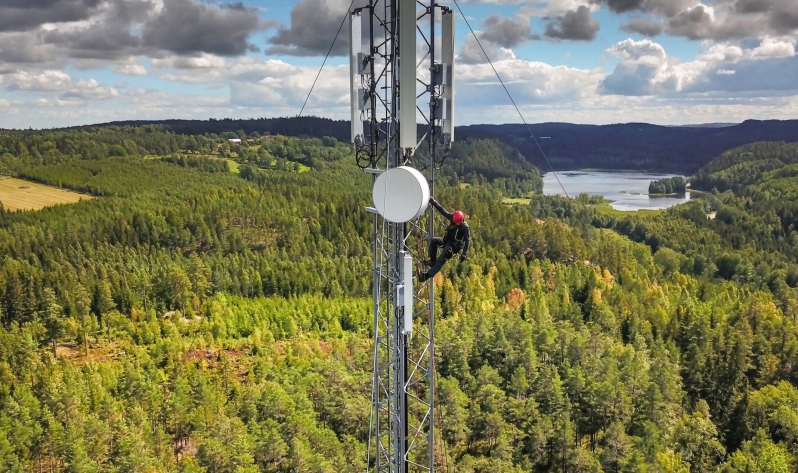
Local governments may be able to provide better internet access than telecom companies.
18 percent of students lack reliable broadband internet at home. President Joseph R. Biden proposes to narrow the digital divide that exists for poor and rural Americans by funding municipal broadband networks across the United States to allow every American to connect to high-speed internet.
The White House announced its intention to allocate $65 billion of the President’s bipartisan infrastructure framework toward broadband funding to reduce prices and increase internet speeds across America. Instead of subsidizing for-profit telecom companies, President Biden prioritizes municipal broadband networks that could better support underserved communities. Municipal broadband networks provide internet services, similar to for-profit companies such as Verizon, but are controlled by local governments—meaning there is often less pressure to make money and more incentive to serve hard-to-reach individuals.
Some Republicans have suggested that broadband should be left out of any public infrastructure proposal because it is not similar to classic infrastructure spending, such as building roads or bridges. U.S. Senator Marsha Blackburn (R-Tenn.), for example, has argued that getting every American online is not a worthwhile goal if doing so increases the national debt.
Four Republican senators, led by U.S. Senator Shelley Moore Capito (R-W.Va.), have proposed a significant funding increase for broadband, demonstrating a willingness by some Republicans to expand internet access to more Americans.
But legislators disagree on how to allocate money for increased broadband access. Republicans favor subsidizing existing for-profit networks, whereas Democrats prefer expanding municipal broadband networks.
Enticing large telecom companies to expand into poor or rural areas is challenging. Historically, the government has had to offer subsidies to extend broadband to rural communities. Even the president of the broadband industry’s top trade association acknowledged that municipal broadband networks do better at providing service to poor or rural communities because municipalities are less concerned with maximizing profits.
Municipal broadband networks, however, are not reserved for unprofitable rural areas.
The city government of Chattanooga, Tennessee, operates a municipal broadband network that makes high-speed internet available to all 180,000 residents and receives a top rating for internet speed, value, and reliability. Since the network’s founding, internet prices have never increased. During the pandemic, the government has provided free high-speed broadband access to 30,000 children with no data limits.
The government plans to offer 10 years of free broadband access to low-income households, which is only possible because the government’s broadband network reaches the entire city. For-profit companies cannot offer comparable deals because extending the companies’ networks to every home is unprofitable.
Not all municipal broadband expansions have succeeded. Many municipal broadband networks fail because of high costs. During the pandemic, state and local government budgets have plummeted and many cities have trimmed their budgets to account for decreased tax revenue.
Broadband infrastructure projects require municipalities to take on debt because of the enormous upfront costs, and unsuccessful projects often lead to expensive litigation and unreliable service. A recent study, underwritten by the broadband industry’s top trade association, found that because private companies tend to spend more efficiently on broadband infrastructure than local governments, subsidizing private companies instead of municipalities can be more cost-effective.
The broadband industry’s trade association has argued against allowing municipal broadband networks in most situations, and 17 states prohibit municipalities from providing broadband access altogether. Earlier this year, U.S. Representative Billy Long (R-Mo.) proposed a bill that would prohibit all municipal broadband networks across the country.
Funding municipal broadband networks, however, is gaining bipartisan support.
Arkansas’ Republican Governor Asa Hutchinson recently signed a bill allowing local governments in the state to build municipal broadband networks if the municipality partners with experienced broadband providers. U.S. Representative Anna Eshoo (D-Calif.) has introduced a bill that would remove all barriers on local governments creating municipal broadband networks.
Proponents of municipal broadband networks argue high-speed internet is a utility, not a luxury.
Many digital advocates consider Chattanooga’s municipal broadband network a success. Funded with both a substantial loan and a federal grant, the city’s network has grown to over 120,000 subscribers—more than four times the number of customers required for the service to break even in the long term. The project has provided almost 10,000 jobs and offered $2.6 billion in “community benefit” over the last decade. Improved internet service has allowed the city to rebrand itself as an “innovation hub,” leading some New York and San Francisco-based startups to move to Chattanooga.
Today, Chattanooga is a premier city for remote work, and because of its successful municipal broadband network, one of its neighbors—Knoxville—has approved the development of its own municipal broadband network in part to stop businesses from leaving town. But the future of municipal broadband access depends on the outcome of President Biden’s proposal.
"close" - Google News
August 11, 2021 at 11:19AM
https://ift.tt/3ALayZR
Can Municipal Broadband Networks Close the Digital Divide? - The Regulatory Review
"close" - Google News
https://ift.tt/2QTYm3D
https://ift.tt/3d2SYUY
Bagikan Berita Ini














0 Response to "Can Municipal Broadband Networks Close the Digital Divide? - The Regulatory Review"
Post a Comment